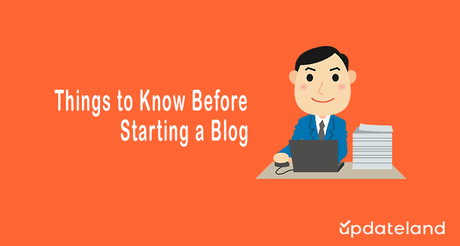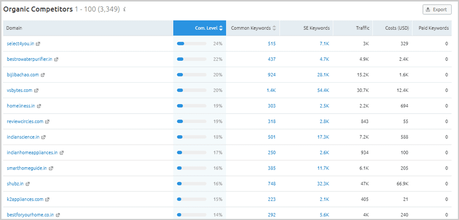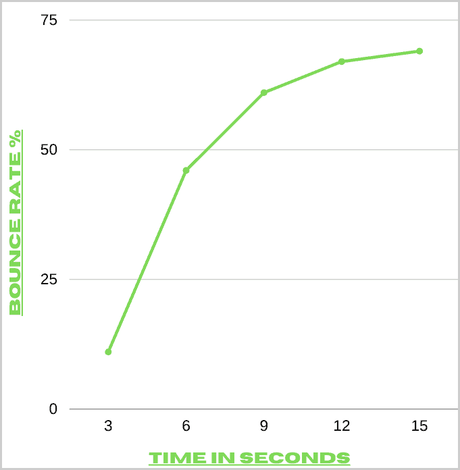Here is an ultimate list of things to know before starting a blog in 2020.
If you want to start a blog and looking for advice on starting a blog, then you will love this new article.
Let’s start with- “You’ll (probably) fail”.
I do not mean to be negative or pessimistic, it’s just what “generally” happens (don’t lose hope yet, you can change this).
According to this report, only 1 in 12 businesses succeed.
Now, that’s a report for “businesses”. The worse news is, there are more blogs in almost every industry, than there are actual “businesses”. Hence, the success rate for “blogs” gets even thinner.
The good news? It’s just as easy for you to succeed only if you pay attention to the details right from day 1. Or, minute 1 of your “I’ll be a blogger” decision.
Let’s get started.
Things to Know Before Starting a Blog

1. Pick an easy, short, memorable domain name
I’m sure I’m beating a dead horse here. Almost every article on the web on this topic has this listed.
However, it’s without doubt one of the first, as well as most important aspects of your blogging career.
“cerebrumconvalescent.com” vs. “thinkbetter.com”. Which do you think is the better option? They both mean almost the same thing, don’t they?
However, I’m sure you liked the second option better? Well, a lot of your marketing and exposure would depend on your “domain name”.
I’d really not waste much of your time. So, let me just say that your domain name should be short, related to your context/content, preferably creative, and overall easy to remember.
Also, avoid spammy EMDs (Exact Match Domains). These are domains matching “exactly” with the keywords you’re targeting. E.g. “buyrooftilesinlondon.com”.
These worked like magic in 2010. Not anymore. In fact, EMDs may get you penalized if you’re not ultra-careful while using them.
Rather, go for something generic and more professional, e.g. “shelter.com”, “tileup.com” etc.
Also, you can go with any domain extension. However, .com is generally the best.
2. Choose a niche/topic you actually are interested about
People quit when they get bored. It’s common human psychology. Imagine starting a blog on quantum physics when you don’t have any interest in the topic.
Don’t forget that it’ll take you some time to start making money as well. Hence, working for free, on a topic/niche that bores you to death is the ultimate recipe for failure.
So, just make sure that whatever your blog is about, is something that interests you. It can be recipes, fishing, even water vapour. Point is, you can’t pick a topic you’re not interested about.
3. Keep your blog centered around 1 topic
A major mistake, a very easy one to make for most new bloggers is going for multiple topics. Your prime focus primarily is money at this point, and so, you may get tempted to go multiple keywords, in multiple industries.
Don’t do that! Google has become smarter. It detects the overall “industry” of your website. If you write about cars and cups and plants and drugs and everything else, you’ll only confuse the search engines.
This will make it very hard for you to rank in any one specific industry. Also, you’re less likely to build yourself an authority in an industry if you claim to be an authority in every field.
Instead, choose 1 specific industry/topic. E.g. “Travel”, “Automobiles”, “Information Technology” “Lifestyle” etc. Now, if you’re going with “Travel”, you can write about hotels, flights, ideal destinations etc.
Or, you can also make your blog on a “micro niche”. These are sub-industries, very specific and narrow. Yet, these generally have lower competition, and because most of your articles will be very similar to each other, it becomes easier to rank.
E.g. “Lifestyle” or “Luxury” is a broad niche. On the other hand “supercars”, “luxury watches”, “luxury purses” are micro niche industries you can work on. So, you can either write about all the “luxury” products on your new blog, or, concentrate on a very specific luxury item.
Some more examples- “Smart homes” is a broad niche. Micro niches in the industry include “smart locks”, “automated window controllers” etc. Similarly, you can either write about “Computers” in general, or specifically about gaming laptops, business laptops, productivity computers etc.
4. Keep learning
I’ve observed it in the industry that once someone starts a blog, they gradually “stop learning”. You can’t just “write content, share, make backlinks” and wait for rankings to follow you.
The Search Engines are extremely volatile. And, it’s always changing. There’s always and forever something you can learn which will help you make your blogs better.
And, you also should keep learning about your own topic/niche. E.g. if you start a blog on cooking, it’ll help you if you start reading books, listening to podcasts and start watching Youtube videos for yourself.
In fact, before you start a blog, list out the top 25-30 competitors in your industry. (If you use SEMrush, you get a full list of competitors and key-metrics about them.)

Read the competitor blogs thoroughly, monitor their ranks if you want, try to understand their publishing frequencies, see how they bring in their traffic and so on. Point is, put in the research.
5. Check your domain for copyright or trademark infringements
The most common “domain” mistake? Taking up a domain just because it sounds cool, easy or familiar, without research.
In simpler words, if you register a domain name “TeslaIndia.com”, the Electric Car company “Tesla” can actually file a lawsuit against you, and take the domain back.
Meaning, you may lose years of hardwork and maybe even the revenue generated using the domain.
In fact, you shouldn’t legally register domains which are even “similar” to trademarks.
The “Anti-Cybersquatting Consumer Protection Act” and the “Uniform Domain Name Dispute Resolution Policy” are just two of the many laws you should pay a bit of attention to.
Hey, obviously it’s not as dangerous as it sounds. Billion-dollar companies aren’t going to sue an average blogger just for registering a phonetically similar domain. The same goes for smaller companies.
However, there “is” a chance of that happening. So, why take the chance, right?
Also, it’s not that you’ll always lose a legal battle. Many factors are considered in one such case. However, you should look at the “Academy of Motion Picture Arts and Sciences v. GoDaddy.com” case to help you understand the picture better.
All in all, try to go for unique names which aren’t similar to any other companies/brands or trademarks.
You can even give “generic” phrases a try. My own domain “UpdateLand” is a pretty good example (Atleast, I hope so).
6. Check your domain for spam and its previous history
It’s totally possible that you buy a domain, work hard on it, and it may not even get indexed! That happens when the domain is penalized.
Meaning, the domain was previously owned and the actions of the previous owner(s) lead to it being penalized.
There are two easy ways to make sure your domain is fresh and not previously owned. Or, if it had a history, isn’t spammed.
First, just go to the Web Achieves and enter your domain name. This will show you the domain’s “previous preview”. You can even select specific dates and years. See if there was any content on it, if any, was it of quality?
If a website did exist on the domain, you must verify a few more things. The “link profile” of the domain for starters. Bad backlinks are one of the primary reasons why a domain is penalized.
Now, I suppose you’re new to the whole blogging thing, right? How do you know which backlinks are good and which aren’t? Well, fortunately, you can use SEO tools like SEMrush which do your job for you! (It’s free).
Start SEMrush Free 14-days Pro Trial Now
SEMrush among many other things, audits your entire backlink profile, and tells you exactly which domains may be hurting your domain.
Not just that, it even helps you automate the entire process of backlink removal, in a few clicks. You can read my SEMrush review. I bet you’ll need the tool sooner or later in your blogging career.
7. Check social media handle availability
I’ve seen quite a few new bloggers miss out on this. Once you’ve finalized a domain name, make sure you’ve social media handles available for the same.
Social Media has long been considered an indirect ranking factor for websites.
Hence, make sure you’ve exact-match usernames/handles available on social media channels for your domain. You always can use words like “official” “the” in the handles if the exact-matches aren’t available.
However, that’s exactly what you should avoid. For starters, check Facebook, Instagram, Pinterest, Reddit and Twitter for your social media handles.
8. Pick the right web hosting
A major mistake you’re about to make is going for free web hosting! Don’t! That’s quite possibly a career-suicide even before you start.
Google has been pretty vocal about how speed affects your website. The speed also affects your bounce-rate, and even conversion-rate for your affiliate links and banner ads!
Here’s a graph I created to get you an idea of how speed affects your bounce rate:

(Data source)
Would you believe if I told you just 100 milliseconds may be worth millions on a web page? Well, Walmart reported a 1% increase in revenue (that’s a lot of money by its standards) just by improving their speed by 100ms!
Another company, Mobify, reported an annual increase in revenue of $380,000.00 by reducing their homepage load time by just 100ms!
Even if “money” isn’t your definition of success, a slow website would not rank very well on Google. And, I do believe; for a blog, any blog, “rank” is the ultimate “success yardstick”, isn’t it?
In short, a slow website would not let you succeed, period. And, the speed is determined to a large extent by your web hosting.
Hey, I get it. You’re just starting out. You don’t have a fortune to spend. I’ve been there too.
That is why I’ve compiled a list of the best cheap web hosting solutions just for situations like this. You can start as low as $1.50/month, without compromising on quality!
9. BE PATIENT!
Why all caps? Yes, I’m trying to tell you how important this is. In fact, I may go as far as telling you it may be “the” most important thing to know before you start a blog.
You definitely won’t make money blogging in your first week. And, I’m almost certain you won’t make money in the entire first month. In fact, there’s a very good chance you don’t see a cent in your first 6 months altogether.
The same goes for your ranks. Do not expect to hit the top 3 positions in the first month (unless, you found golden keywords.)
This is why social media matters. More so in your first few months. As there’s no or little organic traffic, you utilize as many social media channels as possible, and get as much direct traffic from the channels as you can.
Why “being patient” is important? When you don’t see any or substantial success in the first few months, you’re tempted to give up. What you do not know is, this is how blogging works. It’s pretty normal and every new blogger goes through this.
Why should you trust me? I’ve been doing this for nearly 10 years now. I’ve see at least 100 bloggers fail. And, often they had a really good chance at success had they just kept going.
10. Do not apply for Adsense or Affiliate networks (right away)
This is one of those things which I wish I knew before starting a blog.
As soon as we get a blog, we go online and search for “ways to make money from a blog”.
There, we learn that Adsense and Affiliate Marketing are the two most common ways to do that.
What do we do next? We apply! Both to Adsense and probably a dozen best affiliate networks.
You know what happens next? We get rejected. From all of them! The worse part is, most of these companies have a “cooling off” period. So, you can’t apply for another X number of days or months.
More importantly, you’ve hit their “rejected list”. Meaning, the next time you apply, it’ll be harder to get in.
So, I’d advise wait at least 4-6 months before applying to these networks. Build your blog, get some traffic, give them reasons to accept you.
11. Do not use Copyrighted images
In the early phases of your blogging career, it doesn’t seem like a very serious factor you need to pay attention to. Well, you do.
Right from Day 1, make sure there’s no copyrighted content on your blog. You can get professional stock images absolutely free from sites such as www.pixabay.com, www.pexels.com and many others.
Need to personalize your images? Make them more professional? You can use any of the websites like Canva to do that! They even let you create animations, using drag & drop, 0 “skills” needed, in seconds, for free!
How serious is this copyright thing? Well, let’s just say that even mega corporations such as Microsoft have been sued by individuals over copyrighted images. The damages leading to well over USD 2.25 million! So, serious? You tell me.
12. Post less (if you have to), but of quality
You don’t need to churn out 30 blog posts a month. Not even 10. As few as 2 blog posts/month are more than enough.
Given that, these 2 blog posts are of immense information/relevance to your audience.
Back in 2010, the more you published, the more you ranked. Because, you ranked for almost anything you published. Even copied content.
It’s 2020. It’s hard ranking even for unique, original, informative content. Imagine where you will be if you’re just published dead grass?
Do note that “more blog posts” still result in more traffic. Simply because you can rank for more keywords (no matter how low), and visitors have more posts to read.
Hubspot says that 16+ posts/month should get you 3.5x more traffic than blogs posting <4 posts/month.
However, the point here is, publish as much as you can, “without” compromising on the quality.
13. Pay attention to User-Experience and Interface
If you’re just starting out, you’re likely to ignore this. I know because I sure did (and, back in those ancient times, it didn’t even matter).
But, today your UI matters not just indirectly but also directly when it comes to rankings.
In other words, you need to have a clean and simple website. Minimise distractions (banners/sidebars/ads). The font, spacing, color template and everything else matters when getting the right UI.
How to do all that? The easiest option is to get a well-optimized theme. These are often tested by professionals and found to work best when it comes to Search Engine crawlers and user-conversions!
14. Make sure you have a “Contact Us”, “Privacy Policy” and “About Us” page
Since my early days, I’ve been hearing how Google “may” consider a “contact us”/”about us” page as a “trust factor”.
Now, there hasn’t been any hard evidence to support this theory. But, considering how much attention Google pays to the minute details now, it does seem plausible.
Anyway, it sure will help boost trust for your visitors. If they get to know you (“about us” page), and have a means to contact you (contact us) page it sure is a trust-booster, isn’t it?
As far as a “Privacy Policy” goes, well, it’s mandatory by law to have that on your blog.
So, I’ll just say that before your first post goes live, make sure you have these three pages ready.
I get it. Most Privacy Policies or T&C pages are similar if not identical. Will you be facing the “duplicate content” penalty? Nope!
This is a video directly from Google making it clear that these pages wouldn’t lead to duplicate content issues.
15. Use multiple income sources
When I was starting out, I made a major mistake of relying solely on Adsense. Well, it’s not all my fault. Back then, Adsense was paying really good.
However, I later realized how much money I ‘could’ make if I just used other monetization sources as well.
A blog doesn’t have to be limited just to 1 income source. That’s the beauty of it!
So, you totally should use Adsense and Affiliate Marketing. But, banner ads, and (honest) sponsored posts are worth a try as well.
Additionally, you can always sell your own products and services on your blog as well! In some cases, you can even partner with local businesses. You get them sales/lead/visitors, they give you a commission. (idea: “best car washing company in Houston”. )
Bonus:
Here is other experienced bloggers advice on starting a blog.
Shubha Tiwari

Anyone must know his/her potential about writing in the particular niche…trust on self…and must know while he/she has patience or not….Rest, he/she will learn from pro bloggers like you.
Vishwajeet Kumar

Choosing the right niche is very important. A niche can be anything which you are passionate about and have good knowledge. So, you can share quality and helpful content. Many newbies just follow the crowd whether they know things or not. Ultimately they failed. So, It is very important.
Yasar Arafath

Blogging is Not a Over-Night Success Field.
Santosh Gairola

Reason to know why you want to start a blog [in short clear vision to start a blog].
Saurabh Tiwari

Always keep in mind, why you are starting it.
Sumit Sarkar

The reason behind starting the blog.
KKaran Bhardwaj

The first and most important thing is, state of mind. This thing plays a big role for those who want to alive in the blogging industry for long run. It helps you to become big bull.
Abhilasha Poddar

Niche, hours he/she can contribute, purpose and above all his/her expectations from it.
Sumit Kesheri

A person should not run after the blogs which everyone is running after only because for the seek of good returns perhaps the person should understand his field of interest and then smoothly execute his/her plan in the subject the person chooses.
Now you know all the things which you need to consider before starting your blogging journey. Your next question can be “what do I need to start a blog?”. Don’t worry. I got your back.
Here we go.
What do I need to start a blog?
Now, there are few basic things you’ll definitely need when starting a blog. Contrary to popular belief, you can launch your new blog for less than $40.00 for the entire YEAR!
For starters, you definitely need to read this guide on how to start a blog. (*Self promotion, but hey, it’ll help you, step-by-step, with screenshots!)
As for a checklist, here are the things you need to have before starting a blog:
- A domain (you get this free, if you go with most of the best web hosting companies).
- A hosting server, obviously. (You can check the best WordPress hosts here)
- A professional, SEO-optimized theme.
- A SSL certificate (These are now “mandatory”. Again, go with any of the hosts listed in the above articles and you’ll almost always get it for free).
- A SEO tool (this is optional, but, you’re bound to need it at a later time. Click here to activate SEMrush free trial for 14 days without spending zero penny.)
Now, you surely need a ton of other things. But, because you’re just starting out, I’d not overwhelm you. Let’s take it slow, right.
Summary- 15 things to know before starting a blog
So, those were the most basic yet most important things to know before starting a blog. Do note that this list isn’t “absolute”. Meaning, there’s a lot more you should know before starting a blog.
However, for now, these blogging tips for starting a blog will totally help you launch a successful blog. If you follow all of these, you can avoid legal hassle, SEO-penalties and capture that initial traffic-boost from the different traffic-sources.
All in all, the best piece advice on stating a blog that I can give is- START! With each passing day, you gain at least a few hundred competitors! Armed with the knowledge of these things to know before starting a blog, what’s stopping you?
